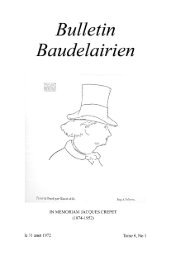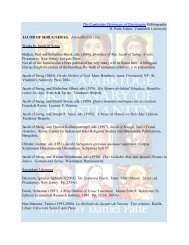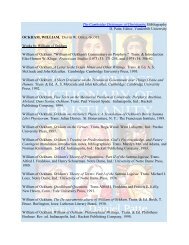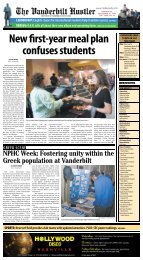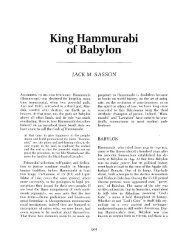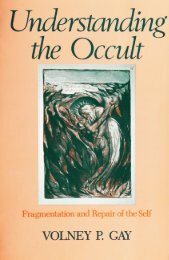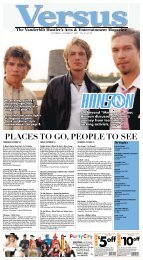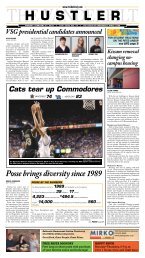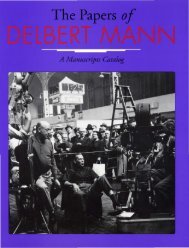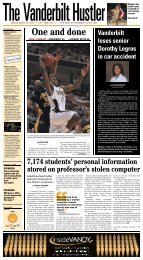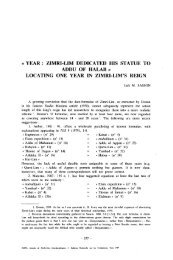From the Editor From the Reader - DiscoverArchive Home ...
From the Editor From the Reader - DiscoverArchive Home ...
From the Editor From the Reader - DiscoverArchive Home ...
Create successful ePaper yourself
Turn your PDF publications into a flip-book with our unique Google optimized e-Paper software.
How did you get into writing about music?<br />
It was purely to tell people about <strong>the</strong> performers.<br />
The underground press started up probably<br />
around ’65, ’66; it was really under way<br />
by ’67. Everybody knew how much I loved<br />
<strong>the</strong> blues, and I knew this kid, Paul Williams,<br />
who started Crawdaddy. He said, “Go interview<br />
Howlin’ Wolf.” So I did an interview with<br />
Howlin’ Wolf. Then he said, “It’d really be<br />
great if you could write about more music<br />
that you like.” So I said I’d ra<strong>the</strong>r write about<br />
Robert Pete Williams or Skip James than Moby<br />
Grape or Jefferson Airplane. But essentially<br />
it was a very simple thing. I simply couldn’t<br />
turn down <strong>the</strong> opportunity to tell people<br />
about this music that I thought was so great.<br />
At that time, in <strong>the</strong> ’60s and ’70s,<br />
<strong>the</strong>re was a large gulf between popular<br />
culture and high culture, wasn’t <strong>the</strong>re?<br />
Yes, and I’d say that gulf persisted. The first<br />
couple of books I published—in ’71 and ’79—<br />
didn’t have <strong>the</strong> slightest possibility of getting<br />
reviewed in <strong>the</strong> above-ground press. They were<br />
very well reviewed in <strong>the</strong> underground press.<br />
(I don’t mean to boast about it.) That wasn’t a<br />
problem. But <strong>the</strong> idea of a book like Feel Like<br />
Goin’ <strong>Home</strong> being reviewed in <strong>the</strong> New York Times<br />
Book Review—it was never going to happen.<br />
And in fact, even as late as 1986, when Sweet<br />
Soul Music came out, <strong>the</strong> only way <strong>the</strong> book got<br />
mainstream reviews was through <strong>the</strong> back door<br />
because by that point, a number of people who<br />
had started out with <strong>the</strong> underground press<br />
were in positions at newspapers and mainstream<br />
magazines. I think only in very recent years has<br />
it been generally recognized that America’s greatest<br />
cultural contribution to <strong>the</strong> world is in its<br />
vernacular music—whe<strong>the</strong>r it’s Duke Ellington<br />
or Merle Haggard or Bobby Blue Bland.<br />
Many readers will recognize you as <strong>the</strong><br />
biographer of Elvis Presley.Why did you<br />
decide to write a book about Elvis?<br />
The first thing I wrote about Elvis was in ’67<br />
because he had put out three singles in a row:<br />
“Big Boss Man,”“U.S. Male”and “Guitar Man.”<br />
I may be mixing up <strong>the</strong> order, but basically <strong>the</strong>y<br />
were three blues singles.And I wrote something<br />
like, “Elvis is going back to his roots.” Which<br />
was purely <strong>the</strong>oretical. But that’s how it felt.<br />
Then I reviewed Elvis’ ’68 TV special in<br />
<strong>the</strong> Boston Phoenix. And <strong>the</strong>n <strong>the</strong> first or sec-<br />
ond thing I wrote for Rolling Stone was about<br />
“<strong>From</strong> Elvis to Memphis,” <strong>the</strong> album. But<br />
again it was, in a sense, placing Elvis in <strong>the</strong><br />
same cultural context as Solomon Burke,<br />
James Brown, Bobby Blue Bland. Taking his<br />
music seriously.<br />
Then at some point you said,<br />
I will write a book about Elvis?<br />
No, it wasn’t that at all. [laughs] It was like an<br />
epiphany almost. Three things came toge<strong>the</strong>r<br />
in time between ’85 and ’86.<br />
The first was when I was writing Sweet Soul<br />
Music. I was riding down McLemore [in Memphis]<br />
with a woman named Rose Clayton, who<br />
had grown up in south Memphis. So I’m driving<br />
down McLemore with her, and we go by<br />
this kind of shut-down, boarded-up store on<br />
<strong>the</strong> corner. It was a drugstore, and she said,“I<br />
can remember Elvis would be in here all <strong>the</strong><br />
time waiting for his cousin to get off work. He’d<br />
just be sitting at <strong>the</strong> counter, just drumming<br />
his fingers.” And she said: “Poor baby.” And I<br />
suddenly thought about this kid with acne and<br />
drumming his fingers and waiting for his cousin<br />
to get off work, and it was like this flash: This<br />
was not a legend, this was not a myth.<br />
And <strong>the</strong>n a guy named Alan Raymond was<br />
making a film about Elvis, a documentary. He<br />
asked me to do <strong>the</strong> script, and got me all <strong>the</strong>se<br />
interviews that Elvis had done in ’55 and ’56.<br />
And I listened to <strong>the</strong>se interviews, and I’m thinking,<br />
Gosh, Elvis could tell his own story. I had<br />
never thought of it from that perspective before.<br />
At <strong>the</strong> same time Gregg Geller was putting<br />
out <strong>the</strong>se reissues of Elvis’ records on RCA,<br />
<strong>the</strong> beginning of <strong>the</strong> first serious attempt to<br />
reconstitute <strong>the</strong> catalog. So I did <strong>the</strong> notes for<br />
a number of <strong>the</strong>m. For “The Sun Sessions”<br />
CD, I called up Sam Phillips and asked,“How<br />
did you produce Elvis? How did you get <strong>the</strong><br />
material? How did you go through it?”Again<br />
I got this sense not of history as it stood, but<br />
of history being made before anyone knew it<br />
was going to be history.<br />
Now you’ve been writing about<br />
Sam Cooke.What was <strong>the</strong> attraction<br />
to writing a biography about him?<br />
Along with Ray Charles, he was probably <strong>the</strong><br />
foundation for <strong>the</strong> contemporary soul or<br />
rhythm & blues sound that evolved in <strong>the</strong> mid-<br />
’50s to <strong>the</strong> mid-’60s. He was probably <strong>the</strong> biggest<br />
star in gospel music when he switched over to<br />
pop in 1957. And when he switched over, it<br />
created tremendous shock waves in <strong>the</strong> gospel<br />
world. With his first pop release in <strong>the</strong> fall of<br />
’57 [“You Send Me”], he had a No. 1 pop hit.<br />
What drew me initially to Sam Cooke is <strong>the</strong><br />
romance, <strong>the</strong> ambition, and <strong>the</strong> talent of Sam<br />
Cooke. Here is an artist who continued to grow<br />
right up until <strong>the</strong> day he died [in 1964].<br />
What has accounted for his<br />
continuing influence in music?<br />
His style, which was so accessible, and <strong>the</strong> songs<br />
that he wrote, songs like “Wonderful World,”<br />
“You Send Me,”“A Change Is Gonna Come,”<br />
or “That’s Where It’s At.” Songs like “A Change<br />
Is Gonna Come” and “Wonderful World” continue<br />
to be recorded again and again.<br />
It’s also <strong>the</strong> simplicity of <strong>the</strong> construction<br />
of <strong>the</strong> songs he wrote, along with <strong>the</strong>ir incredible<br />
craft. And <strong>the</strong>n his singing is so accessible,<br />
so instantly charming and ingratiating.<br />
It’s like Ray Charles told me just before he<br />
died [in 2004],“Man, <strong>the</strong> cat never hit a wrong<br />
note. And I’m not somebody who says that<br />
easily. But what’s much more important, he<br />
sang every note with feeling.”<br />
Sam Cooke evolved a <strong>the</strong>ory of writing and<br />
of singing: Essentially, he believed that a popular<br />
song was a song that, once somebody heard<br />
it, should be simple enough so <strong>the</strong>y could sing<br />
along with it.And <strong>the</strong> verse—and this he learned<br />
from Louis Armstrong—was something that<br />
could almost be spoken. Whereas <strong>the</strong> chorus<br />
provides <strong>the</strong> melodic hook, and that was <strong>the</strong><br />
thing that people would always remember. If<br />
you listen to his songs, you can hear that quality.<br />
He compared his singing of notes to Louis<br />
Armstrong because of his delivery of it. He said,<br />
“Don’t listen to <strong>the</strong> way our voices sound; listen<br />
to <strong>the</strong> way we deliver <strong>the</strong> verse.”<br />
Looking back, what do you think has been<br />
<strong>the</strong> connection in all your music books?<br />
I think <strong>the</strong> connection is that it’s all been about<br />
what I love. [laughs] They’ve all been books<br />
about <strong>the</strong> artistic process and an exploration<br />
of human behavior. In <strong>the</strong> author’s note in<br />
<strong>the</strong> front of <strong>the</strong> Sam Cooke book, I quote Jean<br />
Renoir’s film “The Rules of <strong>the</strong> Game,” where<br />
he says, “The terrible thing about life is that<br />
everyone has his reasons.” My aim has always<br />
been to show everybody’s reasons. V<br />
V a n d e r b i l t M a g a z i n e 59



